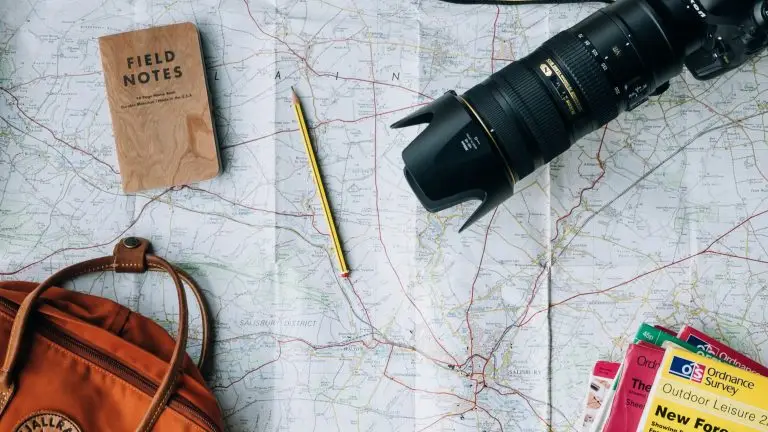
12 Great Irish Books You Should Read This Year
How many of you know that James Joyce was/is an Irish writer, not British? Or similarly, U2 and Snow Patrol are Irish bands, not British
Human species is a fascinating enigma as we have an innate desire to question our origins. This is not a misplaced fascination when we try to comprehend our place in the universe and explore the evolution of humans. This quest has captivated scholars and curious individuals, just like you now, throughout history.
Interestingly, homo sapiens history is not just about the biological changes. It is also about the resilience, innovation, and adaptability that have shaped us and the world.
This unique quest requires extensive work from experts across various fields. Through their work, we gain invaluable insights into the origins of our species, ancient migrations, and the development of behaviors. We also learn how evolution distinguishes us from other forms of life. However, human evolution is not just about evolution; historians also discuss the cultural, social, and intellectual achievements that have shaped our civilization.
Yuval Noah Harari’s book Sapiens: A Brief History of Humankind sparked my interest in Sapiens a few years ago. It offered a new perspective coupled with thought-provoking insights. Although the book gives a unique perspective, many of the best books like Sapiens exist.
And we will discuss just those books to read if you like Sapiens. After all, there are many perspectives that you should read to understand homo sapiens history. So, let’s discuss the best books like Sapiens for intriguing insights!
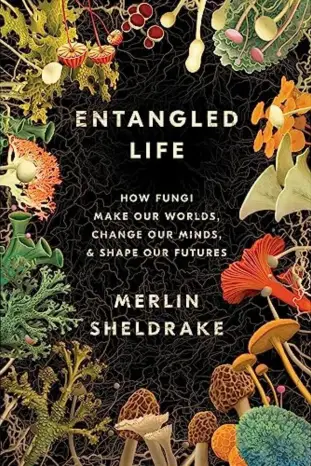
Entangled Life by Merlin Sheldrake explores the world of fungi, bringing a new perspective on their role in the earth’s ecosystems and the fabric of life itself. Fungi have fascinating life cycles and capabilities, making them intelligent entities that challenge our conventional understanding of life.
Sheldrake, a biologist with a Ph.D., uses his extensive research to reveal how fungi are crucial to the planet’s health. His research involves decomposition and nutrient cycling processes to plant communication and symbiosis. The book is not a scientific study, however. Sheldrake uses personal anecdotes and thought-provoking theorization to interconnect nature, where fungi are the architects of life’s entanglement. He argues that by studying fungi, we can gain valuable insights into the sustainability, resilience, and even the future of our planet.
He also discusses innovative uses of fungi, from decomposing plastic wastes to creating sustainable building materials. Interestingly, mycologists have also explained how fungi can save the world. It is one of the best books to read if you like Sapiens, as it touches on the very foundational organisms of life. Here’s the writer Merlin Sheldrake explaining fungi and how it is essential to human life.
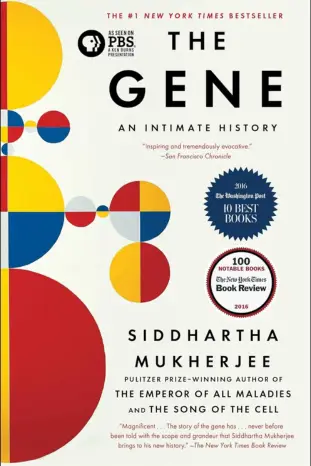
We all know that a gene is a basic unit of inheritance, as it contains information related to physical and biological traits. That’s just biology. However, a marvelous book like The Gene happens when writers like Siddhartha Mukherjee combine science, history, and personal stories with exploring the gene.
Mukherjee is a Pulitzer Prize-winning author who traces the evolution of genetic science from the 19th century with Gregor Mendel’s pea plant experiments to gene editing technologies like CRISPR. He simplifies complex scientific concepts and discusses genetics’ implications for understanding ourselves and shaping our futures.
As happens in every field, there’s a good, bad, and ugly side to everything. Genetic science is no stranger to that either. Mukherjee discusses these darker periods of genetic science, when research advanced so much that it could manipulate genes, including genetic determinism.
He also explores the personal aspect of genetics, including stories from his own family’s struggles with genetic disorders, adding a personal element to the narrative. This aspect of the book discusses how genes determine our health and identity.
Overall, it is one of the best accessible books on genetics. If you are also interested in the blueprint of life and collective well-being, this is one of the best books like Sapiens.
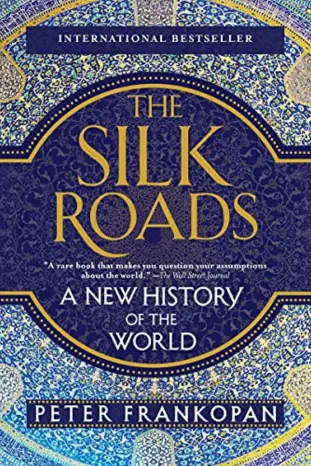
If you are starting to think now that this is some scientific blog talking about books like Sapiens, well, it’s not. How? Because it’s time to bring a new perspective to human evolution and history. And there’s no better book than The Silk Roads by Peter Frankopan to discuss that.
The book is interesting because it shifts the focus of world history from a Eurocentric perspective to the complex trade routes of the East. Peter reexamines the course of human civilization through the routes of the Silk Roads. He argues that the Silk Roads connected the East and West for trade and acted as the route to exchange ideas, cultures, and innovations.
He details in an engaging way how the silk and spice trades, Mongol invasions, and oil politics of the 20th and 21st centuries have been the axis on which global history has changed. Tracing these routes from the ancient world to the modern day put the Middle East, Central Asia, and beyond as the center of the world.
This unique and alternative historical perspective shows how the West has always been intertwined with the East. Overall, it is one of the best books similar to Sapiens as it explores evolution using the history lens.
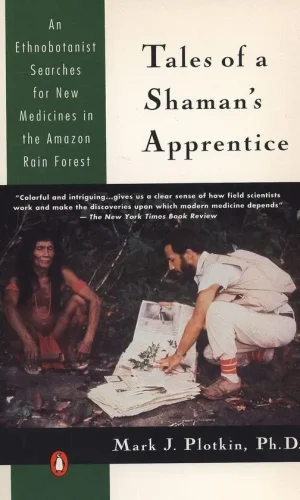
A Shaman’s Apprentice is probably the most unique book, offering an extraordinary perspective from our discussion. The author, Mark Plotkin, is a Harvard ethnobotanist who researches rainforest preservation in collaboration with indigenous tribes.
His teacher was the famous Richard Evans Schultes, known as the first Westerner to discover the plant medicine Ayahuasca. If you’d like to know more about this, you can watch an interesting Colombian movie called The Embrace of the Serpent, based on Schultes.
Mark Plotkin, like his mentor, is on a quest to learn from indigenous tribes and help them preserve their knowledge. Each chapter is an incredible story of one of his trips to indigenous tribes in the Amazon rainforest. It gives an introduction into a completely different world and is extremely adventurous.
A Shamans Apprentice later turned into a children’s book about Kamanya, a young boy from the Tirio tribe in the Amazon. Kamanya wants to learn his people’s ancient healing ways under the tutelage of a revered shaman. As Kamanya embarks on this path, we see the Amazon’s rich biodiversity and the invaluable medicinal plants it houses. The book also teaches about the threats facing the Amazon, such as deforestation and the loss of biodiversity.
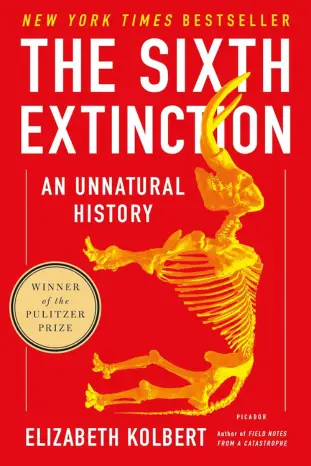
The Sixth Extinction: An Unnatural History is a thought-provoking exploration of the mass extinctions through the history of our planet. Kolbert argues that we are witnessing the sixth mass extinction, a devastating event unlike any other in our planet’s history. Why is that so? Because it is driven by the activities of one species: humans.
She relies on extensive research and firsthand fieldwork across the globe, Kolbert, to examine the fate of various species. These species include Panamanian golden, Sumatran rhino, and many others at risk of extinction.
Kolbert uses scientific analysis, historical context, and narrative journalism to show the impacts of human-induced climate change. It shows how humans are the reason behind habitat destruction, ocean acidification, and other environmental crises.
She introduces readers to the scientists and researchers racing against time to understand and mitigate the consequences of this widespread extinction event. By chronicling the stories of species that have gone extinct or are on the brink, Kolbert invites the reader to confront the harsh realities of biodiversity loss occurring at an alarming rate.
One of the best works on climate change in recent times, the book is a cautionary tale and a call to action. It encourages us to reconsider our relationship with the natural world. After all, humans are resilient, and this is what we are discussing in best books like Sapiens.
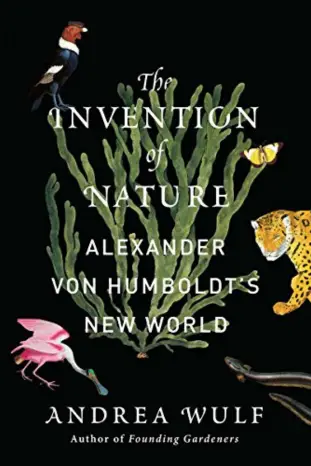
The world is full of ignorant people, which is not bad. What’s terrible is that when people are ignorant of people who try to warn, make an impact, or innovate something new. Ignoring such people always comes with a price, as people realize their importance too late.
Alexander von Humboldt was one such person who warned about climate change almost 200 years ago, but only now are people paying attention to him. It is possible because of Andrea Wulf’s compelling work, “The Invention of Nature: Alexander von Humboldt’s New World.”
This book is a compelling biography of Alexander von Humboldt, a visionary naturalist and explorer. Wulf takes us on a journey through Humboldt’s travels across Europe, South America, and Russia. She highlights his pioneering work in understanding the interconnectedness of nature.
In the late 18th and early 19th centuries, Humboldt observed nature as a vast, interconnected web centuries before the concept of ecosystems. His detailed observations and view of nature challenged the reductionist view that the natural world is something to be controlled.
She also highlights his advocacy for the abolition of slavery and his influence on prominent figures such as Charles Darwin, Henry David Thoreau, and John Muir. Also, how his ideas and theories presaged modern environmentalism, laying the foundation for conservation, climate science, and geomagnetic fields.
There’s so much more that you can learn about Alexander von Humboldt after reading the book. It is one of the best books like Sapiens especially if you look at it from the perspective of biological evolutions and the interconnectedness of nature.
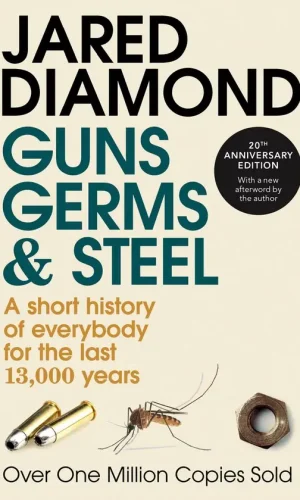
Genes, trade, fungi, and history are not the only factors responsible for human evolution. War and the rise and fall of empires also define who we are today. Guns, Germs, and Steel is one of the best books like Sapiens, which explains why human societies have developed so differently globally.
Diamond combines ecology, anthropology, and evolutionary biology insights to challenge conventional narratives about historical progress. He proposes that the wide disparities in power and technology between human societies are not sudden. They can be traced back to environmental differences and the availability of domesticable plants and animals rather than any inherent superiority of one group.
Yali, a politician from New Guinea, asked Diamond why Europeans came to have so much “cargo” or material wealth while New Guineans had so little. This query made Diamond investigate 13,000 years of human history. From his research, he concluded that geographical and environmental factors set certain societies on trajectories of growth and development that allowed them to conquer others.
The title “guns, germs, and steel” is apt as it represents the tools of European colonizers who could dominate other societies not because of their intellectual or moral superiority but because of their geographical luck, which provided them with advanced technology and powerful weaponry.
The book is praised for its comprehensive approach to understanding humanity’s past. Although we may disagree with Diamond on many counts, this is one of the best books to read if you like Sapiens.
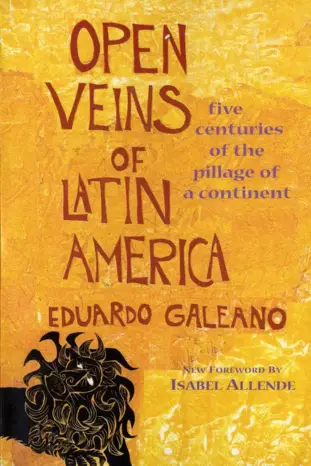
Open Veins of Latin America is the only book on our list by a non-American and non-European writer, apart from Siddhartha Mukherjee, who is Indian-American. Eduardo Galeano was a Uruguayan journalist, writer, and poet.
This book is one of the best critiques of Latin America’s exploitation and impoverishment. It covers exploitation over five centuries, beginning with the arrival of European colonizers in the 15th century and ending in the 20th century.
Galeano combines history, economic analysis, and personal narrative to show how a continent rich in resources yet suffered/ing from poverty and underdevelopment. He argues that Latin America’s misery resulted from its resources and labor being systematically extracted to benefit the Europeans’ industrial growth.
The author backs his point by discussing the theft of precious metals and the exploitation of agricultural commodities. He also discusses modern forms of economic dominance, such as controlling oil, minerals, and other natural resources.
Surprisingly, military dictatorships in Chile, Argentina, and Uruguay banned the book due to its anti-imperialist stance and critique of authoritarian regimes. However, the book remains relevant and one of the best books like Sapiens, more than 50 years on.
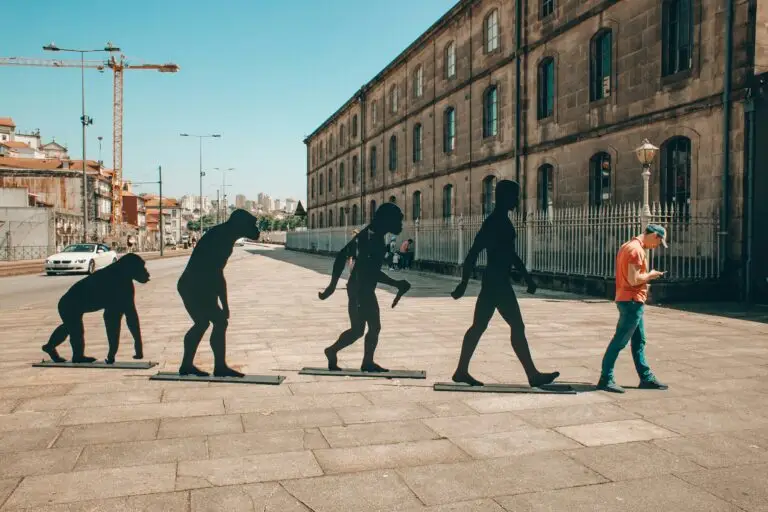
The quest to understand our origins as a species is not a newfound interest. Humans have questioned the origins of their existence, life, and beyond for centuries. If it weren’t for that, humans wouldn’t have been adaptable and, most importantly, innovative to move forward.
The list of these best books like Sapiens, covers science, history, anthropology, and indigenous knowledge to help us better understand human existence. Ultimately, this intellectual pursuit keeps us interconnected with the natural world.
Do you have any similar books to recommend?
If so, please leave a comment below!
Do you want global book, music, and movie recommendations straight to your inbox?
Sign up for the newsletter below!

How many of you know that James Joyce was/is an Irish writer, not British? Or similarly, U2 and Snow Patrol are Irish bands, not British

As they say, never judge a book by its cover. But you can certainly judge a book store by the way it looks. If you

It’s amazing how we read about different countries and cities being destroyed by war and natural calamities, etc. And then people rebuilt everything into something
